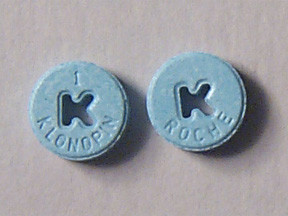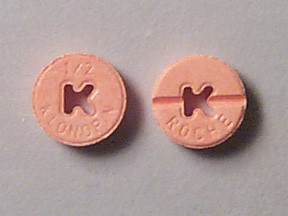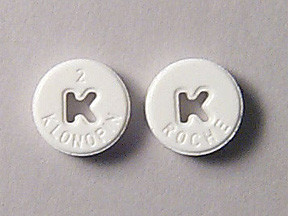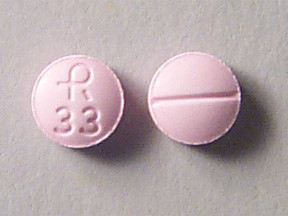CLONAZEPAM - ORAL
PHONETIC PRONUNCIATION: (klo-NAY-zeh-pam)
COMMON BRAND NAME(S): Klonopin
GENERIC NAME(S): clonazepam
Uses
USES: Clonazepam is used to prevent and control seizures. This medication is known as an anticonvulsant or antiepileptic drug. It is also used to treat panic attacks. Clonazepam works by calming your brain and nerves. It belongs to a class of drugs called benzodiazepines.
How to use CLONAZEPAM - ORAL
HOW TO USE: Read the Medication Guide provided by your pharmacist before you start taking clonazepam and each time you get a refill. If you have any questions, ask your doctor or pharmacist. Take this medication by mouth as directed by your doctor, usually 2 or 3 times daily. Dosage is based on your medical condition, age, and response to treatment. For children, the dose is also based on weight. Older adults usually start with a lower dose to decrease the risk of side effects. Do not increase your dose, take it more often, or take it for a longer time than directed. Take this medication regularly to get the most benefit from it. To help you remember, take it at the same times each day. Do not stop taking this medication without consulting your doctor. Some conditions may become worse when this drug is suddenly stopped. Your dose may need to be gradually decreased. This medication may cause withdrawal reactions, especially if it has been used regularly for a long time or in high doses. In such cases, withdrawal symptoms (such as seizures, mental/mood changes, shaking, stomach/muscle cramps) may occur if you suddenly stop using this medication. To prevent withdrawal reactions, your doctor may reduce your dose gradually. Consult your doctor or pharmacist for more details, and report any withdrawal reactions right away. When this medication is used for a long time, it may not work as well. Talk with your doctor if this medication stops working well. Though it helps many people, this medication may sometimes cause addiction. This risk may be higher if you have a substance use disorder (such as overuse of or addiction to drugs/alcohol). Take this medication exactly as prescribed to lower the risk of addiction. Ask your doctor or pharmacist for more details. If you have several different types of seizure disorders, you may experience a worsening of seizures when you first start using clonazepam. Consult your doctor right away if this happens. Your doctor may need to add or adjust the dose of your other medications to control the seizures. Tell your doctor if your condition persists or worsens.
Side Effects
Precautions
Interactions
Overdose
Images
Reviews
Faq for CLONAZEPAM - ORAL
Clonazepam is used to treat and control seizures and panic disorder.
Clonazepam works by enhancing the effects of a neurotransmitter called gamma-aminobutyric acid (GABA) in the brain, which helps to reduce abnormal electrical activity and calm the nerves.
It should be taken orally as directed by your doctor. The dosage may vary depending on your condition. It is usually taken a few times daily, with or without food.
Common side effects of Clonazepam may include drowsiness, dizziness, coordination problems, and fatigue. These side effects are generally mild and tend to improve with time.
Yes, Clonazepam can be habit-forming. It is important to follow your doctor's instructions and not exceed the prescribed dosage to minimize the risk of dependence or addiction.
Drinking alcohol can increase the sedative effects of Clonazepam, so it is generally not recommended. It is advisable to consult your doctor regarding any potential interactions.
The onset of action varies and can range from 30 minutes to 2 hours after taking the medication. It is important to be patient and follow the prescribed dosage for optimal effectiveness.
Yes, Clonazepam can be prescribed for anxiety disorders, including panic disorder and social anxiety disorder. It helps to manage symptoms such as excessive worry, restlessness, and panic attacks.
Clonazepam should be used during pregnancy only if the potential benefits outweigh the risks. It may pose a risk to the developing fetus, so it is essential to discuss any concerns with your healthcare provider.
Warning
WARNING: Taking clonazepam with opioid medications (such as codeine, hydrocodone) may increase your risk of very serious side effects, including death. To lower your risk, your doctor should have you take the smallest dose of clonazepam that works, and take it for the shortest possible time. Get medical help right away if any of these very serious side effects occur: slow/shallow breathing, unusual lightheadedness, severe drowsiness/dizziness, difficulty waking up.
Disclaimer
IMPORTANT: HOW TO USE THIS INFORMATION: This is a summary and does NOT have all possible information about this product. This information does not assure that this product is safe, effective, or appropriate for you. This information is not individual medical advice and does not substitute for the advice of your health care professional. Always ask your health care professional for complete information about this product and your specific health needs.






For Depression: Took blue clonp n I don't get that hard feel r they fake r what ??
By Crazy D 64 on 15 Jan, 2024
For Most recently a pharmacy that did have it did not take my insurance and it was about 20.00 it's very hard to find: This is the only pill that works for me. It's a miracle drug for my chronic conditions
By Anxious on 05 May, 2025